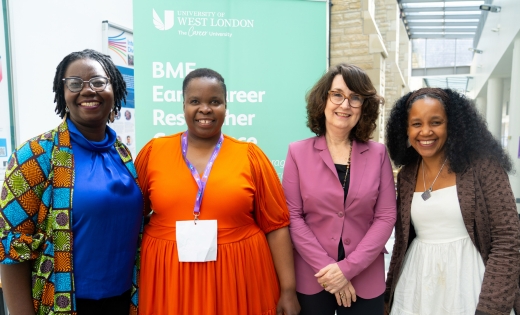Building communities of influence among BME researchers
Earlier this year, the University hosted the seventh BME Early Career Researchers conference. Dr Sally Osei-Appiah, who organised the event, reflects on how to build on its galvanising spirit.
Dr Sally Osei-Appiah at the conference in the Maurice Keyworth Building

On 13 July, the University hosted the seventh Black and Minority Ethnic (BME) Early Career Researchers (ECRs) hybrid conference in the Maurice Keyworth Building. It was the first time that the conference, which we ran with the University of West London (UWL), had taken place outside of London.
At Leeds, we were thrilled to be the first to bring it up north – especially for its benefit to our University’s ECRs and Postgraduate Researchers (PGRs).
Founded in 2017 by Dr Bernadine Idowu-Onibokun of UWL, the conference aims to equip and empower BME ECRs with the tools and the skills required to remain and thrive in academia. Since then, the conference has grown and gone from strength to strength – evidence of its unique contribution to enhancing the wellbeing and professional lives of the attendees.
It was an immense pleasure to welcome the more than 400 delegates to our University, in person and online, and to be able to organise what many attendees called an ‘inspiring’ conference.
Building communities of influence
The theme for this year’s conference was ‘building communities of influence’. It was a rallying call for BME ECRs and PGRs to consolidate their efforts and share their insights from previous events and turn them into the building blocks of influential communities of people in academia.
Professor Simone Buitendijk, Vice-Chancellor and President, opened the conference with an address examining the role universities can play in reducing inequalities.
The subsequent morning sessions explored navigating academia as a minoritised person. Jason Adday, the University of Cambridge’s youngest Black professor, told us to value collaboration and collectivism over the individualism so rampant in academia, and that acting collectively is the best way to punch through barriers and achieve change.

Dr Sally Osei-Appiah, Brightness Mangolothi of HERS-SA, Professor Simone Buitendijk and Dr Yoselin Benitez-Alfonso from the School of Biology
For me, a key highlight of the conference was hearing from Brightness Mangolothi, Director of HERS-SA, the professional development programme for women employed in the higher education sector in South Africa.
Brightness, in her full authentic self, used the concept of ‘ubuntu’ – an Nguni term meaning ‘humanity’ and often translated as ‘I am because we are’ – to argue that it was only through unity and network building that ethnically minoritised groups could survive and thrive in academia.
As she put it: “the need for formal and informal support cannot be overemphasised for BME groups, thus building communities is critical for micro and macro level influence.”
In the afternoon, we took part in four workshops covering leadership in places not designed for ethnically minoritised groups, wellbeing and self-care, leveraging opportunities, and thriving as a Black female academic.
Impetus for change
I was assisted in my task as the lead conference organiser by the PGR Diversity team and members of the Leeds 100 Black Women Professors Now! programme – the pioneering systemic change initiative set up in 2021 to increase the number of Black women in the academic pipeline.
Going forward, it is important that we take the discussions, decisions and inspiration of the conference and turn them into solid progress.
It has already provided the impetus for the launch of the Network for BME PGRs here in Leeds, which we did on 14 July with the support of Dr Kendi Guantai, the Dean for Equity, Diversity, and Inclusion (EDI).
Let us now take that galvanising spirt of ubuntu and build the Leeds BME PGR community into a community of influence.
Posted in: University news